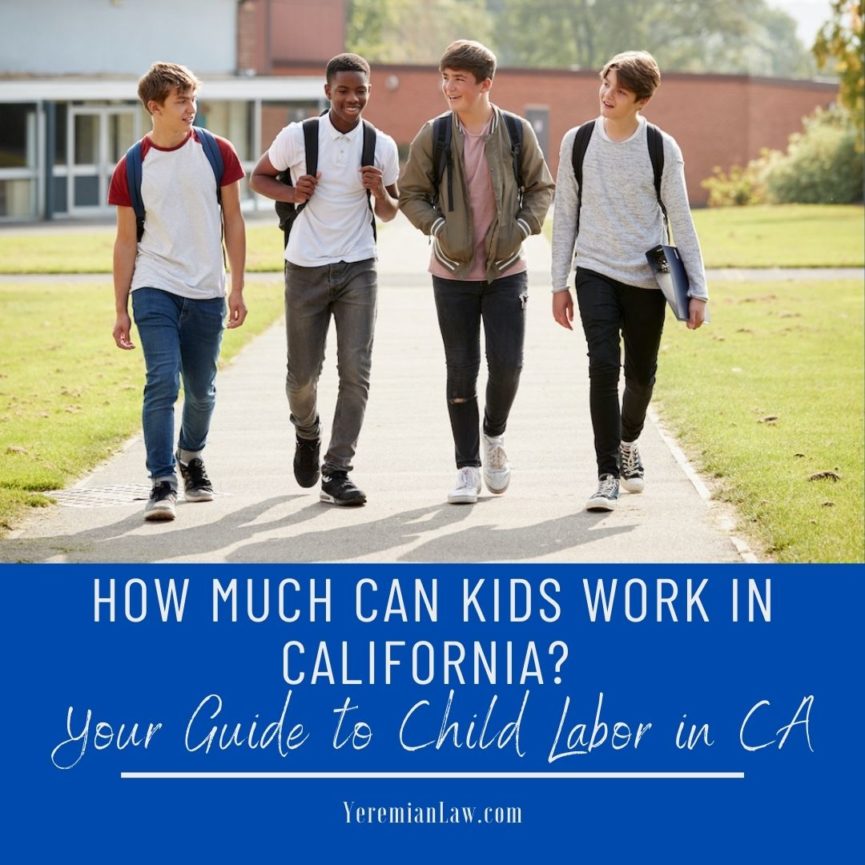If you’re like many people, you’re wondering about California’s child labor laws – how much kids can work, what hours they’re allowed to work and how much they must be paid. This guide explains child labor law in California and what happens if an employer violates it.
Your Guide to Child Labor in CA
In the United States, federal law allows minors to work – but only if they’re 14 or older (with some exceptions), and they must work under certain conditions. Any minors under the age of 18 must have a work permit to work – and generally, that comes from the minor’s school. When school isn’t in session, minors can get a work permit from the superintendent of the school in their district. (Typically, a minor can’t get a work permit until they’ve had their prospective employer sign a form from the Department of Education called a “Statement of Intent to Employ Minor and Request for Work Permit.”)
Related: Can an employer require workers to speak English at work?
A Note on Minors Working in the Entertainment Industry
Minors who are between the ages of 15 and 18 who work in the entertainment industry must have a work permit, as well – and their employers must have a permit to employ them. Both of those permits come from the Labor Commissioner’s Office. That includes actors, musicians, models and others in the entertainment field, and minors still need permits if the entertainment is “noncommercial in nature.”
Related: Can your boss fire you for talking about religion at work?
School Attendance Requirements for Minors Who Work in California
Minors between the ages of 12 and 15 must attend school full-time unless they’ve graduated or have a high school equivalency certificate. Older kids (16- and 17-year-olds) who haven’t graduated aren’t required to attend school full-time, but if they’re regularly employed and haven’t graduated, they must attend a continuation school for at least 4 hours a week.
The following table outlines how many hours minors are allowed to work.
| Age | Hours on School Days | Hours on Non-School Days | Total Number of Hours |
| 12 and 13 | Not allowed to work on school days | Between 7 a.m. and 7 p.m. except from June 1 through Labor Day, when they’re allowed to work between 7 a.m. and 9 p.m. | Up to 8 hours per day (except on school days), but no more than 40 hours per week |
| 14 and 15 | Up to 3 hours on school days | Between 7 a.m. and 7 p.m. except from June 1 through Labor Day, when they’re allowed to work between 7 a.m. and 9 p.m. | Up to 8 hours per day (except on school days), but no more than 40 hours per week |
| 16 and 17 | Up to 4 hours on school days | Between 5 a.m. and 10 p.m. on evenings that precede school days; Between 7 a.m. and 12:30 a.m. on days that do not precede a school day | Up to 8 hours per day, but no more than 48 hours per week |
Exceptions to School Requirements
All minors age 6 through 15 must attend school full-time unless they’re high school graduates or:
- Attend an approved alternative school
- Are tutored
- Are on an approved leave of absence
- Have transferred from another state when there are 10 or fewer days left in the school year
- Have justifiable personal reasons, such as illness, court appearances or religious observances.
In some circumstances, 14- and 15-year-olds who are enrolled in Work Experience Education may be allowed to work full-time during school hours.
Related: What are my legal rights to sue an employer
What Are the Penalties for Employers That Violate Child Labor Laws?
Employers that violate child labor laws are subject to criminal penalties. In fact, fines can range up to $10,000 and include confinement in the county jail for up to 6 months.
It’s important to note that the employer – not the minor – is liable for child labor law violations. Employers can’t employ or allow underage minors to work for them if they don’t have a work permit.




